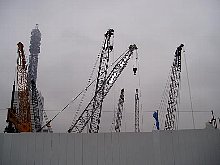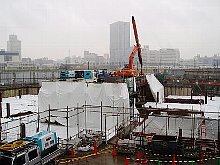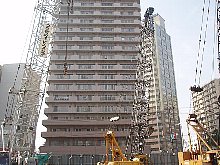- Yokohama-shi Top Page
- Living and Procedures
- Community Development and Environment
- Environmental Conservation
- Environmental Conservation Initiatives
- Pollution Complaints FAQ
- Q2-1 Consultation on noise, vibration, and electromagnetic waves
Here's the text.
Q2-1 Consultation on noise, vibration, and electromagnetic waves
Last Updated November 29, 2024
- The noise and vibration from nearby factories (offices) are terrible.
- The noise of the construction work in the neighborhood is noisy.
- I'm having trouble with the noise of a nearby karaoke store.
- The sound of speakers such as waste collection vehicles is noisy.
- I'm having trouble with the noise of living nearby.
- Is it possible to measure noise and vibration by yourself?
- The nearby stores (signboards, neons) are dazzling.
- I am worried about the effects of electromagnetic waves from radio towers and transmission lines on mobile phones on health.
- I'm planning to buy a house in Yokohama. I'd like to tell you about the environment around me.
Noise and vibration generated from factories and offices are subject to the Noise Control Law (outside site), the Vibration Control Law (outside site), and the ordinance on conservation in Yokohama City Living Environment (outside site) (hereinafter referred to as the "city ordinance").
If noise and vibration generated from factories and offices do not comply with regulatory standards such as laws and regulations, Yokohama City will provide guidance to businesses to comply with regulatory standards.
In addition, if the restricted zone is an industrial area, an industrial area, or a semi-industrial area, the regulatory standards are relaxed than residential areas because the area is determined to improve the convenience of industry. About restricted zone, please refer to Yokohama-shi administration map reporting system (outside site) (Housing and Architecture Bureau City Planning Division).
(Atmosphere and Sound Environment Division Noise Consultation Service Phone: 045-671-2483)
In the case of specific construction work
Work using heavy equipment such as rock drills and pile blowers that generate significant noise and vibration during construction work is stipulated as "specific construction work" in the Noise Control Law and the Vibration Control Law, and the size of noise and vibration Regulations are stipulated. Regulations on working hours, etc. are stipulated.
If the regulatory standards of the Noise Control Law and the Vibration Control Law are not complied with in specific construction work, Yokohama City will instruct the person in charge of the construction work site to comply with the regulatory standards.
Area | Noise Control Law | Vibration Regulation Law | |
|---|---|---|---|
| Criteria | Area No. 1 Area No. 2 | Workplaces for specified construction work Do not exceed 85 dB at the site boundary | Workplaces for specified construction work Do not exceed 75 dB at the site boundary |
Area | Normal work | Prohibitions | Excluded | |
|---|---|---|---|---|
| Start and end of the day | No. 1 Area | During the period from 7:00 to 19:00 | [Night work] From 19:00 to 7:00 | ▲In the event of an emergency due to a disaster or other emergency ▲To prevent danger to human life or body ▲When ensuring normal operation of railways or tracks ▲Permission conditions for private use of roads under Article 34 of the Road Law ▲Conditions for consultation under Article 35 of the Road Law ▲Conditions for permission to use roads under Article 77, Paragraph 3 of the Road Traffic Act ▲Conditions for consultation under Article 80, Paragraph 1 of the Road Traffic Act |
| No. 2 Area | During the period from 6:00 to 22:00 | [Night work] From 22:00 to 6:00 | ||
| Working hours per day | No. 1 Area | Not more than 10 hours | More than 10 hours | ▲In the event of an emergency due to a disaster or other emergency ▲To prevent danger to human life or body |
| No. 2 Area | Not more than 14 hours | More than 14 hours | ||
| Number of working days | No. 1 Area No. 2 Area | Do not exceed six consecutive days | More than 6 consecutive days | ▲In the event of an emergency due to a disaster or other emergency ▲To prevent danger to human life or body |
| Work day | No. 1 Area No. 2 Area | Monday to Saturday | [Sunday and holiday] | ▲In the event of an emergency due to a disaster or other emergency ▲To prevent danger to human life or body ▲When ensuring normal operation of railways or tracks ▲Permission conditions for private use of roads under Article 34 of the Road Law ▲Conditions for consultation under Article 35 of the Road Law ▲Conditions for permission to use roads under Article 77, Paragraph 3 of the Road Traffic Act ▲Conditions for consultation under Article 80, Paragraph 1 of the Road Traffic Act |
| Area No. 1 | All areas of residential areas, neighboring commercial areas, commercial areas, semi-industrial areas, and urbanization control areas Areas up to 80 meters from the boundary of the site of the following facilities in the industrial area (a) Schools, (a) nursery schools, (c) hospitals and clinics, etc., (d) libraries, (e) special elderly nursing homes, (c) certified children's schools |
|---|---|
| Area No. 2 | Areas other than Area No. 1 of industrial areas |
In cases where construction work is not specified, etc.
If construction work that does not correspond to specific construction work or specific construction work complies with the regulatory standards of the Noise Control Law and the Vibration Control Law, Yokohama City will notify the person in charge of the construction work site of noise and vibration. We inform you that complaints have been received, and ask them to consider the noise and vibration loudness and working hours.
In addition, when requesting compensation for house damage due to construction work, etc., the parties will have to resolve it as civil matters. Please use the following free legal counsel for civil legal counsel.
- Free legal consultation in Yokohama City
- Special consultation of each ward
- Hoterasu (Japan Legal Support Center) (outside site)



(Atmosphere and Sound Environment Division Noise Consultation Service Phone: 045-671-2483)
About use of sound equipment (karaoke equipment) in restaurant business, regulations such as use restrictions of sound equipment at night are established according to city regulations Article 52 (outside site) according to restricted zone.
If the use of audio equipment in restaurant business does not comply with regulations such as city ordinances, Yokohama City will instruct restaurants to comply with the regulations.
Restricted areas | 8:00 a.m. | 6-8:00 a.m. | 11:00 p.m. | 0:00 a.m. |
|---|---|---|---|---|
| Type 1 Low-rise Residential Area Type 2 Low-rise Residential Area Type 1 middle- and high-rise residential area Type 2 middle and high-rise residential area | 50dB | 45dB | Use time limit of audio equipment | Restrictions on business hours |
| Class 1 Residential Areas Type 2 Residential Area Quasi-residential area Areas with no restricted zone | 55dB | 50dB | Use time limit of audio equipment | Use time limit of audio equipment (Prevention of external noise) |
| Neighboring commercial areas | 65dB | 60dB | Use time limit of audio equipment | Use time limit of audio equipment (Prevention of external noise) |
| Commercial areas Semi-industrial areas | 65dB | 60dB | 50dB | 50dB Prevention of external noise |
| Industrial Areas | 70dB | 65dB | 55dB | 55dB Prevention of external noise |
(Atmosphere and Sound Environment Division Noise Consultation Service Phone: 045-671-2483)
About advertising broadcast using loudspeaker, we establish regulation about use time, volume of loudspeaker by city regulations Article 51 (outside site).
If advertising broadcasting using a loudspeaker does not comply with regulations such as city ordinances, Yokohama City will instruct businesses to comply with the regulations.
If you would like to provide guidance from Yokohama City to a business operator, please contact the Green Environment Bureau Atmosphere and Sound Environment Division as we would like to ask for information (business name and contact information) to identify the business operator.
Restricted areas | From 8:00 a.m. to 9:00 p.m. | From 9 p.m. to 8 p.m. |
|---|---|---|
Type 1 Low-rise Residential Area | 50dB | No use |
| Class 1 Residential Areas Type 2 Residential Area Quasi-residential area | 55dB | No use |
| Neighboring commercial areas Commercial areas Semi-industrial areas | 65dB | No use |
| Industrial Areas | 70dB | No use |
| Industrial Areas | 75dB | No use |
| Other Areas | 55dB | No use |
How to measure volume: The volume emitted from the loudspeaker is measured at the highest volume on the premises of the building where the person receiving the sound emitted from the loudspeaker lives.
(Atmosphere and Sound Environment Division Noise Consultation Service Phone: 045-671-2483)
Living noises such as footsteps and musical instruments generated from ordinary households are not subject to laws and regulations.
For this reason, if you have problems with living noise, we ask you to discuss with each other and resolve them through management companies and Residential Association.
In that case, the leaflet "Awareness of the sound of the house (PDF: 2,277KB)" is posted on the web page, so I would like you to refer to it.
- City regulations (Article 147) Prevention of noise, etc. associated with daily life (outside site)
- Guidelines for Preventing Living Noise (PDF: 109KB)
- What is the difference?
(Atmosphere and Sound Environment Division Noise Consultation Service Phone: 045-671-2483)

The Yokohama Green Environment Bureau Atmosphere and Sound Environment Division rents sound level meters and vibration meters free of charge for the purpose of preventing pollution. Reservations are required, so if you wish, please apply by phone or other means.
*Rental of sound level meters and vibration meters
(Atmosphere and Sound Environment Division Noise Phone: 045-671-2485)
"Hikari-gai" refers to "a situation in which the formation of a good" light environment "is hindered by improper or unsuitable use or operation of artificial light, leakage light, or adverse effects due to it." It is. (From the Ministry of the Environment's Guidelines for Light Pollution Control)
In Yokohama City, there are no laws or ordinances that directly regulate light pollution for businesses that use lighting, but regarding the environmental considerations required by the Ministry of the Environment when using artificial light, We have formulated the "Guidelines for Measures against Light Pollution".
In the event of a light pollution complaint, based on these guidelines, Yokohama City informs the business operator that a complaint about light pollution has been received and asks them to consider the neighborhood.
In the case of outdoor advertising materials, usage standards such as lighting equipment may be stipulated in the "Outdoor Advertising Ordinance".
Please refer to Urban Development Bureau scenery adjustment section for more information about outdoor advertising matter.
(Atmosphere and Sound Environment Division Noise Consultation Service Phone: 045-671-2483)
Electromagnetic waves are generated from mobile phone base stations, transmission lines, etc., and safety is being investigated in the country. Specifically, the Ministry of Internal Affairs and Communications has jurisdiction over what is generated from mobile phone base stations, and conducts safety surveys (*1). In addition, the Ministry of Economy, Trade and Industry is responsible for electromagnetic fields from power facilities such as transmission lines, and conducts surveys on the effects on the human body and regulations on ultra-low-frequency magnetic fields generated from electrical equipment (*2).
※1 Radio Environment Division, Radio Department, General Communication Infrastructure Bureau, Ministry of Internal Affairs and Communications; 03-5253-5111 (main)
※2 Commerce Information Policy Bureau Industrial Security Group Electricity Safety Division, Ministry of Economy, Trade and Industry; 03-3501-1511 (main)
(Atmosphere and Sound Environment Division Noise Consultation Service Phone: 045-671-2483)
Yokohama City does not respond individually to pollution complaints that have occurred in the area.
In recent years, large-scale condominiums have been constructed in commercial areas or on the site of closed factories, and residents may complain about noise and odors. Regarding the environment in the area where the house is to be purchased, whether there are factories, offices, large-scale commercial facilities, etc. around the planned purchase site yourself, and the traffic volume of arterial roads, daytime / nighttime, weekdays / holidays, etc. We recommend that you check carefully and purchase after being satisfied.
If the restricted area is an industrial area or commercial area, regulatory standards such as noise and vibration are relaxed compared to residential areas. Factories and business establishments operate during the daytime on weekdays to produce noise and smell. On arterial roads, the travel rate of large freight trucks is very high from early morning to daytime on weekdays. Around large-scale commercial facilities, many shoppers gather on holidays, and traffic congestion and exhaust gas may increase. The situation is completely different between daytime and nighttime, weekdays and holidays, so we recommend that you visit the site many times and check it.
In addition, Yokohama city is close to Haneda Airport and Atsugi Airfield, and it is air route for passenger aircraft and US military aircraft, so we recommend that you ask residents living nearby.
- Restricted areasYokohama-shi administrative map reporting system (outside site)Please refer to Housing and Architecture Bureau City Planning Division.
(Atmosphere and Sound Environment Division Noise Consultation Service Phone: 045-671-2483)
You may need a separate PDF reader to open a PDF file.
If you do not have it, you can download it free of charge from Adobe.
![]() To download Adobe Acrobat Reader DC
To download Adobe Acrobat Reader DC
Inquiries to this page
Atmosphere and Sound Environment Division, Environmental Protection Department, Green Environment Bureau
Telephone: 045-671-2483
Telephone: 045-671-2483
Fax: 045-550-3923
Email address: mk-soudan@city.yokohama.lg.jp
Page ID: 219-560-166







